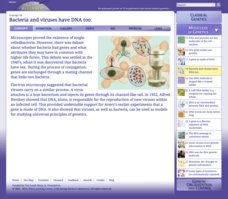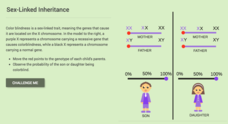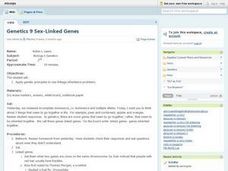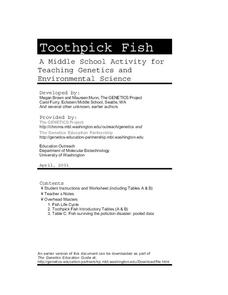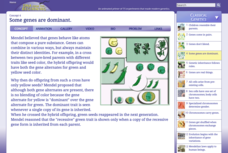Howard Hughes Medical Institute
Stalking the Genetic Basis of a Trait
Need an a-maize-ing lesson to show your class how regulatory genes work? If you use the well-written resource, they'll be all ears! Biology scholars discover the gene responsible for the evolution of the modern-day corn plant through a...
PBS
Stories of Painkiller Addiction: Contemplating Nature vs. Nurture
Does having an addict in your family make it more likely to become one yourself? Explore the genetic risk factors, as well as the prominent environmental influences, for substance addiction in a lesson that encourages awareness and open...
Cold Spring Harbor Laboratory
Bacteria and Viruses Have DNA Too
In the 1940s, scientists discovered bacteria conjugation, the process of DNA transfer or bacterial sex. The discovery proved that bacteria and viruses contain DNA and led to a Nobel prize. Interested individuals learn about the...
Cold Spring Harbor Laboratory
Some DNA Does Not Encode Protein
Roy John Britten easily earned a PhD in nuclear physics—but he found painting with water colors too difficult. Young scientists learn about Britten's life, career, and research with an online interactive. They read a biography, view...
ARKive
Biodiversity and Evolution
Why is diversity in biology so important for an ecosystem? Explore biodiversity, evolution, and natural selection with a presentation for your biology class. It features clear information, activities for further understanding, and...
Virginia Department of Education
Passing Traits to Offspring
What makes each one of us unique? Lead your class in this exciting and educational activity as you uncover traits that show how each individual is different from another. Pupils explore facts about DNA technology and predict the...
Virginia Department of Education
Owl Family Natural Selection
How do genetic mutations within a population lead to future variations? Provide your class with the resources to answer this question and more upon completing an activity on natural selection. The entire class participates in a...
Virginia Department of Education
Building a DNA Model
It has been decades since the discovery of DNA. Still, activities such building this DNA model allow blossoming scientists to better understand the components that form this overall structure. During this activity, they will also...
CK-12 Foundation
Sex-Linked Inheritance
Sex-linked traits indicate a gene's location on a specific chromosome. Scholars learn about sex-linked traits and the specifics behind color blindness in the videos. Then they complete the online interactive to apply their knowledge...
Anthropological Association
Race: Teacher Guide: Race
How has the concept of race changed over time? Explore the genetic, cultural, and social aspects of race through a series of impactful activities. Scholars discover how race is influenced by inherited traits, examine census records to...
Howard Hughes Medical Institute
Lactose Intolerance: Fact or Fiction
Around the world, about 2/3 of adult humans are lactose intolerant. Scholars work in small groups to discuss a few statements about lactose intolerance. Then, they watch a video on the topic and readdress each statement. Whole-class...
BBSRC
Discovering DNA: The Recipe for Life
A pinch of adenine, a dash of thymine and ta-da, you have life! Well, it's not quite that simple, but through this series of activities and experiments young scientists learn about the structure of DNA and how it contains the recipe...
Illinois Department of Natural Resources
Section One: What is Biodiversity?
Four intriguing and scientific activities invite learners to explore the natural resources of their town. The activities cover concepts such as genetic traits, organizing species in a taxonomy, the differences between different species...
Curated OER
Sex-Linked Genes
High schoolers review the concepts of incomplete dominance, co-dominance and multiple alleles. As a class, they are introduced to the concept of sex-linked genes and how they are passed to offspring. To end the lesson plan, they...
Curated OER
DNA, Genes, and Chromosomes
Students review the structure and function of DNA, genes, and chromosomes and are engaged by a demonstration illustrating the relative size of DNA, genes and chromosomes. They also describe through analogy and model the structure and...
Curated OER
Understanding the Power of Genes
Students research the impacts of genetic research on homes, research laboratories, and hospitals. For this genetics lesson, students use the Internet to investigate the ways that genetics has affected our way of life. They present...
Curated OER
X or Y- Does it Make a Difference?
Students examine the X and Y chromosomes. In this research lesson, students use the 5E lesson model as they read articles about human chromosomes then discuss their findings and opinions.
University of Washington
Toothpick Fish
With colored toothpicks representing genes, youngsters practice passing them through generations of fish and learn about heredity. Consider this as an introductory activity since it does not represent recessive genes with lowercase...
Cold Spring Harbor Laboratory
DNA Is Only the Beginning for Understanding the Human Genome
Mario Capecchi requested funding for a new procedure targeting genes and was rejected. Four years later, after he proved it worked, the NIH apologized and funded his research. Use an online interactive to learn about his research and the...
Cold Spring Harbor Laboratory
Some Genes Are Dominant
Dominate a lesson on genetic traits. Young scholars learn about the difference between dominant and recessive traits with an interactive lesson. An animation demonstrates Mendel's work on the inheritance of traits, and interactive...
Cold Spring Harbor Laboratory
The RNA Message Is Sometimes Edited
In 1993, Phillip Sharp and Richard Roberts won the Nobel Prize for their discovery of split gene theory. Learn about the breakthrough with the help of an online interactive. Hear both scientists explain it in their own words, watch an...
Howard Hughes Medical Institute
Neural Control of Walking and Running
Physical therapists state that relearning how to walk often motivates stroke and brain injury patients. Researchers spend a great deal of time focused on understanding the neural control required for walking. They pass along that...
Curated OER
Genome: The Secret of How Life Works
What do you have in common with a fruit fly? About 60 percent of your DNA. The resource, divided into two units, is intended for grades four to eight and another for high schoolers. Both units include eight lessons covering the...
Biology Junction
DNA Technology
One of the first biotechnology breakthroughs occurred in 1982 with the creation of synthetic insulin. Young scientists learn about DNA technology with a presentation and accompanying worksheet. It focuses on DNA extraction and...




